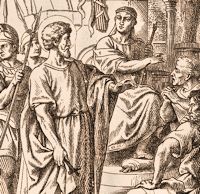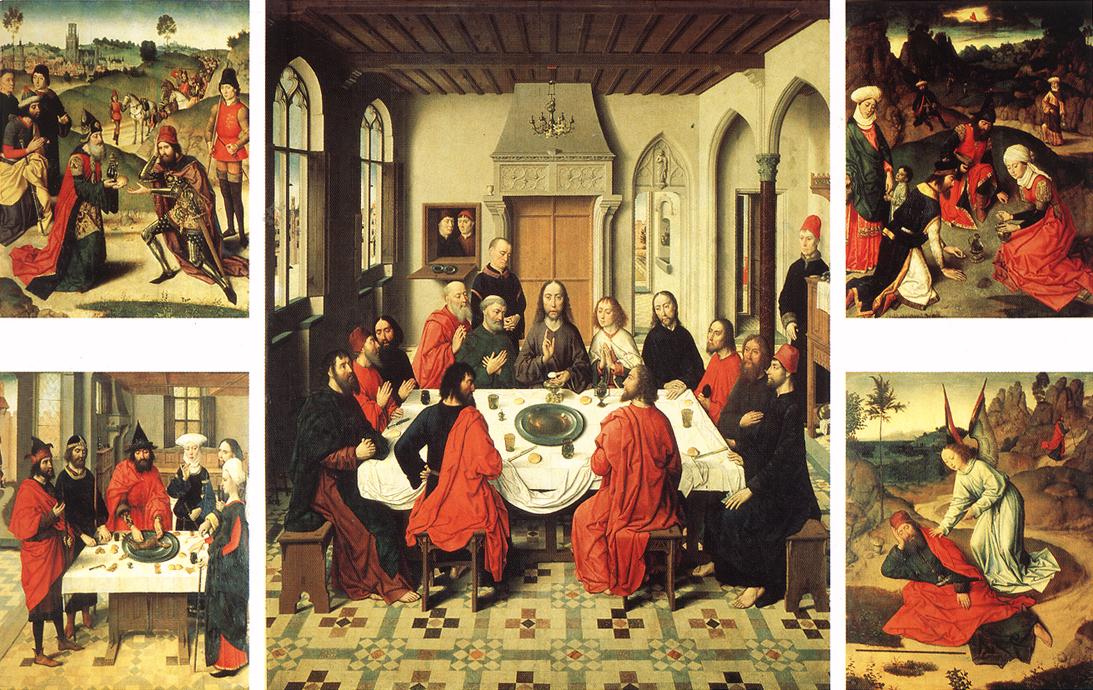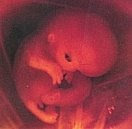44. No man can come to me, except the Father which has sent me draw him: and I will raise him up at the last day.
45. It is written in the prophets, And they shall be all taught of God. Every man therefore that has heard, and has learned of the Father, comes to me.
46. Not that any man has seen the Father, save he which is of God, he has seen the Father.
AUG. He took man's flesh upon Him, but not after the manner of men; for, His Father being in heaven, He chose a mother upon earth, and was born of her without a father. The answer to the murmurers next follows: Jesus therefore answered and said to them, Murmur not among yourselves; as if to say, I know why you hunger not after this bread, and so cannot understand it, and do not seek it: No man can come to Me except the Father who has sent Me draw him. This is the doctrine of grace: none comes, except he be drawn. But whom the Father draws, and whom not, and why He draws one, and not another, presume not to decide, if you would avoid falling into error. Take the doctrine as it is given you: and, if you are not drawn, pray that you may be.
CHRYS, But here the Manichees attack us, asserting that nothing is in our own power. Our Lords words however do not destroy our free agency, but only show that we need Divine assistance. For He is speaking not of one who comes without the concurrence of his own will, but one who has many hindrances in the way of his coming.
AUG. Now if we are drawn to Christ without our own will, we believe without our own will; the will is not exercised, but compulsion is applied. But, though a man can enter the Church involuntarily, he cannot believe other than voluntarily; for with the heart man believes to righteousness. Therefore if he who is drawn, comes without his will, he does not believe; if he does not believe, he does not come. For we do not come to Christ, by running, or walking, but by believing, not by the motion of the body, but the will of the mind. You are drawn by your will. But what is it to be drawn by the will? Delight you in the Lord, and He will give you your heart's desire. There is a certain craving of the heart, to which that heavenly bread is pleasant. If the Poet could say, "Trahit sua quemque voluptas," how much more strongly may we speak of a man being drawn to Christ, i.e. being delighted with truth, happiness, justice eternal life, all which is Christ? Have the bodily senses their pleasures, and has not the soul hers? Give me one who loves, who longs, who burns, who sighs for the source of his being and his eternal home; and he will know what I mean. But why did He say, Except my Father draw him? If we are to be drawn, let us be drawn by Him to whom His love said, Draw me, we will run after You. But let us see what is meant by it. The Father draws to the Son those who believe on the Son, as thinking that He has God for His Father. For the Father begat the Son equal to Himself; and whoso thinks and believes really and seriously that He on Whom He believes is equal to the Father, him the Father draws to the Son. Arius believed Him to be a creature; the Father drew not him. Thomas says, Christ is only a man. Because he so believes, the Father draws him not. He drew Peter who said, You are the Christ, the Son of the living God; to whom accordingly it was told, For flesh and blood, has not revealed it to you, but My Father which is in heaven. That revelation is the drawing. For if earthly objects, when put before us, draw us; how much more shall Christ, when revealed by the Father? For what does the soul more long after than truth? But here men hunger, there they will be filled. Wherefore He adds, And I will raise him up at the last day: as if He said, He shall be filled with that, for which he now thirsts, at the resurrection of the dead; for I will raise him up.
AUG. Or the Father draws to the Son, by the works which He did by Him.
CHRYS. Great indeed is the Son's dignity; the Father draws men, and the Son raises them up. This is no division of works, but an equality of power. He then shows the way in which the Father draws. It is written in the Prophets, And they shall all be taught of God. You see the excellence of faith; that it cannot be learnt from men, or by the teaching of man, but only from God Himself. The Master sits, dispensing His truth to all, pouring out His doctrine to all. But if all are to be taught of God, how is it that some believe not? Because all here only means the generality, or, all that have the will.
AUG. Or thus, When a schoolmaster is the only one in a town, we say loosely, This man teaches all here to read; not that all learn of him, but that he teaches all who do learn. And in the same way we say that God teaches all men to come to Christ: not that all do come, but that no one comes in any other way.
AUG. All the men of that kingdom shall be taught of God; they shall hear nothing from men: for, though in this world what they hear with the outward ear is from men, yet what they understand is given them from within; from within is light and revelation. I force certain sounds into your ears, but unless He is within to reveal their meaning, how, O you Jews, can you acknowledge Me, you whom the Father has not taught?
BEDE. He uses the plural, In the Prophets, because all the Prophets being filled with one and the same spirit, their prophecies, though different, all tended to the same end; and with whatever any one of them says, all the rest agree; as with the prophecy of Joel, All shall be taught of God.
GLOSS. These words are not found in Joel, but something like them; Be glad then you children of Sion, and rejoice in the Lord your God, for He has given you a Teacher. And more expressly in Isaiah, And all your children shall be taught of the Lord.
CHRYS. An important distinction. All men before learnt the things of God through men; now they learn them through the Only Son of God, and the Holy Spirit.
AUG. All that are taught of God come to the Son, because they have heard and learnt from the Father of the Son: wherefore He proceeds, Every man that has heard, and has learned of the Father, comes to Me. But if every one that has heard and learnt of the Father comes, every one that has not heard of the Father has not learnt. For beyond the reach of the bodily senses is this school, in which the Father is heard, and men taught to come to the Son. Here we have not to do with the carnal ear, but the ear of the heart; for here is the Son Himself, the Word by which the Father teaches, and together with Him the Holy Spirit the operations of the three Persons being inseparable from each other. This is attributed however principally to the Father, because from Him proceeds the Son, and the Holy Spirit. Therefore the grace which the Divine bounty imparts in secret to men's hearts, is rejected by none from hardness of heart: seeing it is given in the first instance, in order to take away hard-heartedness. Why then does He not teach all to come to Christ? Because those whom He teaches, He teaches in mercy; and those whom He teaches not, He teaches not in judgment. But if we say, that those, whom He teaches not, wish to learn, we shall be answered, Why then is it said, Will you not turn again, and quicken us? If God does not make willing minds out of unwilling, why prays the Church, according to our Lord's command, for her persecutors? For no one can say, I believed, and therefore He called me: rather the preventing mercy of God called him, that he might believe.
AUG. Behold then how the Father draws; not by laying a necessity on man, but by teaching the truth. To draw, belongs to God: Every one that has heard, and has learned of the Father, comes to Me. What then? has Christ taught nothing? Not so. What if men saw not the Father teaching, but saw the Son. So then the Father taught, the Son spoke. As I teach you by My word, so the Father teaches by His Word. But He Himself explains the matter, if we read on: Not that any man has seen the Father, save He which is of God, He has seen the Father; as if He said, Do not when I tell you, Every man that has heard and learnt of the Father, say to yourselves, We have never seen the Father, and how then can we have learnt from Him? Hear Him then in Me. I know the Father, and am from Him, just as a word is from him who speaks it; i.e. not the mere passing sound, but that which remains with the speaker, and draws the hearer.
CHRYS. We are all from God. That which belongs peculiarly and principally to the Son, He omits the mention of, as being unsuitable to the weakness of His hearers.
47. Verily, verily, I say to you, He that believes in me has everlasting life.
48. I am that bread of life.
49. Your fathers did eat manna in the wilderness, and are dead.
50. This is the bread which comes down from heaven, that a man may eat thereof, and not die.
51a. I am the living bread which came down from heaven: if any man eat of this bread, he shall live for ever.
AUG. Our Lord wishes to reveal what He is; Verily, verily, I say to you, He that believes in Me, has everlasting life. As if He said; He that believes in Me has Me: but what is it to have Me? It is to have eternal life: for the Word which was in the beginning with God is life eternal, and the life was the light of men. Life underwent death, that life might kill death.
CHRYS. The multitude being urgent for bodily food, and reminding Him of that which was given to their fathers, He tells them that the manna was only a type of that spiritual food which was now to be tasted in reality, I am that bread of life.
CHRYS. He calls Himself the bread of life, because He constitutes one life, both present, and to come.
AUG. And because they had taunted Him with the manna, He adds, Your fathers did eat manna in the wilderness, and are dead. Your fathers they are, for you are like them; murmuring sons of murmuring fathers. For in nothing did that people offend God more, than by their murmurs against Him. And therefore are they dead, because what they saw they believed, what they did not see they believed not, nor understood.
CHRYS. The addition, In the wilderness, is not put in without meaning, but to remind them how short a time the manna lasted; only till the entrance into the land of promise. And because the bread which Christ gave seemed inferior to the manna, in that the latter had come down from heaven, while the former was of this world, He adds, This is the bread which comes down from heaven.
AUG. This was the bread the manna typified, this was the bread the altar typified. Both the one and the other were sacraments, differing in symbol, alike in the thing signified. Hear the Apostle, They did all eat the same spiritual meat.
CHRYS. He then gives them a strong reason for believing that they were given for higher privileges than their fathers. Their fathers eat manna and were dead; whereas of this bread He says, that a man may eat thereof, and not die. The difference of the two is evident from the difference of their ends. By bread here is meant wholesome doctrine, and faith in Him, or His body: for these are the preservatives of the soul.
AUG. But are we, who eat the bread that comes down from heaven, relieved from death? From visible and carnal death, the death of the body, we are not: we shall die, even as they died. But from spiritual death which their fathers suffered, we are delivered. Moses and many, acceptable of God, eat the manna, and died not, because they understood that visible food in a spiritual sense, spiritually tasted it, and were spiritually filled with it. And we too at this day receive the visible food; but the Sacrament is one thing, the virtue of the Sacrament another. Many a one receives from the Altar, and perishes in receiving; eating and drinking his own damnation, as said the Apostle. To eat then the heavenly bread spiritually, is to bring to the Altar an innocent mind. Sins, though they be daily, are not deadly. Before you go to the Altar, attend to the prayer you repeat: Forgive us our debts, as we forgive our debtors. If you forgive, you are forgiven: approach confidently; it is bread, not poison. None then that eat of this bread, shall die. But we speak of the virtue of the Sacrament, not the visible Sacrament itself; of the inward, not of the outward eater.
ALCUIN. Therefore I say, He that eats this bread, dies not: I am the living bread which came down from heaven.
THEOPHYL. By becoming incarnate, He was not then first man, and afterwards assumed Divinity, as Nestorius fables.
AUG. The manna too came down from heaven; but the manna was shadow, this is substance.
ALCUIN. But men must be quickened by my life: If any man eat of this bread, he shall live, not only now by faith and righteousness, but for ever.
51b. - And the bread that I will give is my flesh, which I will give for the life of the world.
AUG. Our Lord pronounces Himself to be bread, not only in respect of that Divinity, which feeds all things, but also in respect of that human nature, which was assumed by the Word of God: And the bread, He says, that I will give is My flesh, which I will give for the life of the world.
BEDE. This bread our Lord then gave, when He delivered to His disciple the mystery of His Body and Blood, and offered Himself to God the Father on the altar of the cross. For the life of the world, i.e. not for the elements, but for mankind, who are called the world.
THEOPHYL. Which I shall give: this shows His power; for it shows that He was not crucified as a servant, in subjection to the Father, but of his own accord; for though He is said to have been given up by the Father, yet He delivered Himself up also. And observe, the bread which is taken by us in the mysteries, is not only the sign of Christ's flesh, but is itself the very flesh of Christ; for He does not say, The bread which I will give, is the sign of My flesh, but, is My flesh. The bread is by a mystical benediction conveyed in unutterable words, and by the indwelling of the Holy Ghost, transmuted into the flesh of Christ. But why see we not the flesh? Because, if the flesh were seen, it would revolt us to such a degree, that we should be unable to partake of it. And therefore in condescension to our infirmity, the mystical food is given to us under an appearance suitable to our minds. He gave His flesh for the life of the world, in that, by dying, He destroyed death. By the life of the world too, I understand the resurrection; our Lord's death having brought about the resurrection of the whole human race. It may mean too the sanctified, beatified, spiritual life; for though all have not attained to this life, yet our Lord gave Himself for the world, and, as far as lies in Him, the whole world is sanctified.
AUG. But when does flesh receive the bread which He calls His flesh? The faithful know and receive the Body of Christ, if they labor to be the body of Christ. And they become the body of Christ, if they study to live by the Spirit of Christ: for that which lives by the Spirit of Christ, is the body of Christ. This bread the Apostle sets forth, where he says, We being many are one body. O sacrament of mercy, O sign of unity, O bond of love! Whoso wishes to live, let him draw nigh, believe, be incorporated, that he may be quickened.
Catena Aurea John 6




